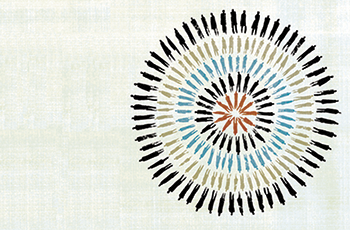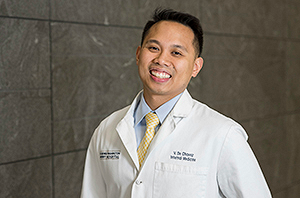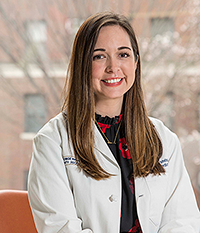Strong commitment to social responsibility is at the heart of the SMHS mission
Cumberland, Maryland, is a picturesque city nestled in the lush ridge-and-valley country of the Appalachian Mountains. Small and isolated, it’s a place that has seen more than its share of hardships; not long ago, it was named the poorest city in the state. But its residents are eager to help their neighbors, boast a can-do spirit, and live by the motto “we don’t give up.”
For Christina Sensabaugh, MD, a resident at the George Washington University (GW) School of Medicine and Health Sciences (SMHS), Cumberland is home. When she moves back this summer to start her career, she’ll be returning to a community where everyone knows everyone else, where if her car breaks down on the way to work, she can knock on the nearest door to find help.

She could practice in vibrant and bustling Washington, D.C., or move to Pittsburgh, which she grew to love during her time in AmeriCorps. But Sensabaugh, her excitement bubbling up, says instead she could make a difference by working to help the people at home. She feels a responsibility to serve her community. “Physicians have a difficult task. We have a profession, a job, but we have something beyond that,” says Sensabaugh, who will be working at Cumberland-based Western Maryland Health System as a hospitalist. “We have influence, not just on our patients, but on our communities. I feel I have an obligation to be socially responsible; I have to be an advocate for my patients. “I know Cumberland is going to be challenging, but I’m better prepared than I might have been if I did my residency training somewhere other than at GW,” she says with confidence. “It’s easy sometimes to lose sight of the desire to have a greater impact, but this is a place that helps you not lose that.” Depending upon whom you talk to, social responsibility has different definitions, especially when it comes to the medical profession. But one thing is certain: A strong commitment to social responsibility is at the very heart of the SMHS mission, which states, “As a globally recognized academic medical center, GW embraces the challenge of eliminating health disparities and transforming health care to enrich and improve the lives of those we serve.” While Sensabaugh makes the trip home to quiet Cumberland, Vincent DeChavez, MD, also a GW resident, will return to the skyscrapers and cacophony of the Big Apple as an infectious disease fellow at Mount Sinai Health System. The health center is 20 blocks from his old high school in New York City, and not far from where he grew up, raised by hardworking parents who know the benefit of helping others: His mom works as a nurse at Bellevue Hospital, his dad as a dentist. “I grew up in Queens and … it was a very diverse place, and diversity was something I really cherished. Diversity in the language you speak, the music you listen to, where you’re from — that’s important to me and all ties into this,” he says of his call to social responsibility.

DeChavez, quiet and introspective, says he wants to help populations of people who are underserved and work to remove the barriers that prevent them from living healthy lives both physically and mentally. “Since it’s the beginning of my career, I think it’s most important to be an observer right now,” he explains. “To see where there are shortcomings in the care of our patients, or where they’re having issues connecting to care, or if they’re having issues with health literacy.” Volunteering at Whitman-Walker Health (Whitman Walker), a nonprofit community health center that specializes in HIV/AIDS and LGBT care, during residency training was eye-opening for DeChavez. Whitman-Walker has long been a part of GW’s commitment to social responsibility; Lawrence “Bopper” Deyton, MD ’85, MSPH, senior associate dean of clinical public health and Murdock Head Professor of Medicine and Health Policy at SMHS, was a founder of the organization. Jeffrey S. Akman, MD ’81, RESD ’85, vice president for health affairs, Walter A. Bloedorn Professor of Administrative Medicine, and dean of SMHS, also volunteered there and served as president of the Whitman-Walker board in the 1990s. DeChavez says when he saw patients at the clinic and heard their stories, he realized “sometimes the medicine is only a Band-Aid on a bigger problem.” It’s not always easy figuring out how to be a physician who can offer more than that, he adds, but it’s something he will strive to do. Though their efforts and avenues are different, the zeal to go above and beyond is common throughout the SMHS community: in the faculty members who give back to the community while also instilling in their students the importance of being socially responsible medical professionals; in the researchers who spend long hours in the lab to find cures for rare diseases; and in program leaders who are developing international partnerships to bring quality health care to some of the poorest nations. “Social responsibility for us in the healing professions is healing individuals, and healing families, and healing neighborhoods, and healing communities, and healing nations,” says Deyton. Deyton says he first experienced the true meaning of social responsibility in the 1960s, a time of “great social upheaval, including the civil rights movement, women’s rights, voters’ rights, and gay rights.” Through those movements, he realized the great disparities that existed in access to quality health care and the discrimination many people faced in trying to find care. Today, Deyton helps students connect with their sense of social responsibility. “We’re trying to weave this into how we’re teaching students to become clinicians and scientists,” he says. “We want them to understand social determinants of health and to take up the mantle of their own social responsibilities when they leave here, and how what they learn at GW can be used to effect positive social change.” Each member of the SMHS community is on a journey when it comes to social responsibility, and there’s no right or wrong, notes David Popiel, MD, MPH, assistant professor of medicine at SMHS and clinical faculty adviser to the GW Healing Clinic. Not every individual, he says, will dive into social responsibility’s deepest waters. “I think of a pool where you have people who sit by the edge and talk about the importance of social responsibility. Then you have those who wade into the shallow end; they’ll say ‘this is meaningful to me, I’ll dip into this.’ Then you have the deep divers; they want and need to be engaged at a [profound] level.” GW is there to provide opportunities for individuals across that spectrum, he says.

Christina Sensabaugh, MD[/caption] The deep divers include those who immerse themselves in the GW Healing Clinic, a student-run organization that supports volunteer clinical sites throughout D.C. and Maryland. Others, like Sensabaugh and DeChavez, choose to participate in the Underserved Medicine & Public Health (UMPH) concentration, an add-on to the Internal Medicine Residency Program. UMPH is a two-year longitudinal program in which residents care for patients at a local community health center, participate in public health information seminars, and design a public health project on a topic of interest. Members of the SMHS community also work to spread social responsibility across borders. By training international physicians and forging partnerships on a global scale, the GW Office of International Medicine Programs (IMP) brings social action to countries that need it most. “We develop programs and try to meet needs in many countries. We bring in aspiring international physicians who otherwise would not have a chance to learn medicine. We educate them, train them, and prepare them to be leaders in their communities,” says Huda Ayas, EdD ’06, MBA ’98, MHSA ’93, associate dean for international medicine and executive director of IMP. For example, IMP has helmed medical missions in Haiti for the past 17 years through an established affiliation with Project Medishare. Students and faculty help provide quality health care to people who don’t otherwise have access to medical professionals. “We don’t develop programs unless we meet with key stakeholders in the country to find out what their needs are and what’s missing,” Ayas says. As a result, “we’re creating impact in these communities; we’re changing lives.” She adds that the definition of a socially responsible medical professional continues to evolve, and that means keeping an eye on the overall health care environment and on the communities SMHS serves. SMHS is also weaving social responsibility into its curriculum, using GW’s unique location in the nation’s capital to show students the positive effect they can have not only in the local community, but also at a national and global level, says Deyton. “We are within a mile or two of almost every U.S. decision-maker around health, be it a government entity, or a nonprofit, or a professional organization,” he says. An addition to the MD curriculum has been the rigorous clinical public health summits, which began in the 2014–15 academic year. Summit topics include HIV/AIDS, childhood asthma, and obesity; starting last year, fourth-year students are able to choose their own clinical public health topic for a summit project (see Health Care Beyond the Exam Room, page 6). SMHS also places importance on the role its students, faculty, and staff have in supporting the Washington, D.C., region. A resident of the District of Columbia for many decades, Susan LeLacheur, DrPH ’08, MPH ’89, PA-C, BS ’80, associate professor of physician assistant studies at SMHS, has paved her own path for giving back to the community. Once a week, she volunteers at Whitman-Walker Health. “For me, personally, I feel like in every patient encounter I ever had, I learn something and I owe something to the people from whom I’ve learned,” she says. “I think that’s particularly true in medical education ... that we owe a debt to the people who provide us with the experience that we require to excel in our professional lives.” LeLacheur adds that the work that goes into being socially responsible must be done not out of obligation, but out of the desire to give back. Even as DeChavez, Sensabaugh, their classmates, and SMHS faculty and leadership take up the mantle of social responsibility in their own work, they know it’s important to pass on what they’ve learned to the next generation. Sensabaugh says it best: “When I go home to Cumberland, part of what I want to do is get high school students involved in science and medicine. I think if you get people involved young, and increase that education and awareness, you’re passing on the importance of the medical profession — and of social responsibility — to younger generations.”



